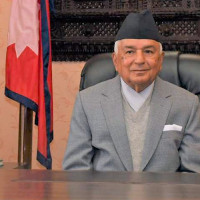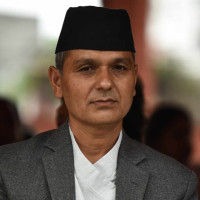- Thursday, 19 February 2026
Link Politics With The Real Economy
Politics is a common subject matter for conversation among people of all types and a great spur to collective action. The driving forces of politics are natural human impulse, vault of aspiration and satisfaction of passion. Politics is more an art than a science, connected to the rise and fall of individuals, societies, institutions and nations on the front wall of statecraft. Modern politics, as a province of rights, representation, legitimacy and policy craft, influences all vital human activities, even non-political spheres of ecology, justice, business and charity.
It is a game of persuasion where mutual interests are defined and peacefully followed by leaders and their followers. The style of politics underscores nonviolent communication and conduct of human beings. It expresses popular interests in the institutional channels of political society and the state. Rebellion, violence and war symbolise pre-civilised human energy, while modern politics is played with composure, code and rules of the game. Violent tools of politics do not form democratic legitimacy as they incur more costs than benefits and lead to the erosion of deep-seated social human nature.
Shrewd politicians
Still, shrewd politicians are not content with a trouble-free life. They have the ambition to spiral up the ladder of political power, envious of rivals and ruthless. They unlawfully desire to acquire something that does not belong to them. Amorality of politics resembles the early Spartan maxim: “the strong do what they can and the weak suffer what they must,” thus halting the latter from mastering their dignity. Civilised politics is mellowed by education, law, age and experience of varied life. Vicious one is febrile, costly to the civilised existence of the weak and less caring to popular wishes.
Neo-liberal turn in politics has diluted the policy sovereignty of the legislature and divorced politicians from popular sovereignty. It has allowed special interest groups to overwhelm the lawful pursuit of people’s lives and liberty. They govern the decision system and skew political power, unable to adjust to the changing balance of ecological, social, economic, digitised technological power, data and online services, which Yanis Varoufakis rightly calls “cloud capital.” He says, “While privatisation and private equity asset-strip all physical wealth around us, cloud capital goes about the business-stripping our brains. To own our minds individually, we must own cloud capital collectively.”
The liberal bent of politics has offered freedom of choice for people and the nation. The neoliberal bent of political economy has, however, cut the choices contributing to the dissolution of class-based worldview, boomed informal work and politics and de-solidarity of people, thus restraining the political mobility of the weak and their right to free collective bargaining. It has further eroded the writ of democratic politics located in the state and its practice of inclusivity, despite the ubiquity of institutions, laws and policies to this end. A new paradigm of politics, therefore, must link to the sphere of real economy, people and nature, uphold sustainability and a wiser understanding of political life.
This is one of the reasons democratic politics tolerates and accepts countervailing power against the incumbent and allows opposition, autonomous media, civil society, courts and social movements to flourish as strong checks. They provide a fresh jolt to conversational life and accountability of leaders to their policies, decisions and actions. The gravity of modern politics is its anti-hierarchical values: it does not make politics a game of winner-takes-all marked by exclusive selfishness of powerful politicians but a mixed-sum where compromise of interests, ideology and identity is mutually set without the tyranny of majority or bigotry of minority.
Similarly, the vocation of politicians is not to seek truth. It is a job left to judges, scientists, the media and scholars. The real job of politics is about rule, an art of governance of all sectors of society. It makes a peaceful array of life by reconciling significant political forces of society. By purporting to create legitimate order, justice and peace it settles political conflicts through dialogue. Politics does not resemble the law of nature but the law of decency. Positivism and natural science can dissipate the domination of fatalism and prejudice and help solve some of social problems, not all arising out of imperfection of human nature. Political life and growth of knowledge are correlated.
Both express the embodiment of deeper conception about freedom and contribute to power-free conversation that can help reform community, society and the state. Democratic politics seeks the unity of ends and means. Suitable means is essential because it sets a pattern of political culture of winning, using and shifting political power through free and fair elections. It represents various generations, genders and classes. It does not ignore the losers of the political game. They are a vital part of the political sphere. This is one of the reasons democracy provides scope for legitimate dissent, negative rights and human rights to people.
It does not purport to subordinate the weak by creating institutional mechanisms for the denial of their rights including the right to participate in multi-scale decision-making — local, national and global affecting them. There is an ethical justification for the distribution of power and wealth in society so that people are not alienated from politics and infatuated to pre-political life of passive cynicism or anti-political life of special interest groups who ride on the back of machine politics to put a brake on the egalitarian effects of democracy.
Political realists ground their arguments on evil human nature which is unchangeable. They, therefore, believe in the balance of power so that wild manifestation of human nature does not glitch social peace. Constitutional separation of power, checks and balances, devolution of authority and universal rights are precisely arranged to handle uncontrolled craving of human beings for power without public purpose and without moral limits. Norms, institutions, laws, authorities and educational systems are equally created to socialise, acculturate and regulate human nature to reasonable confines.
This nature is a source of freedom but it requires proper taming and discipline. Social solidarity is another factor to avert the politics of survival of the fittest resonating Darwinism where several calculating messages, indoctrination, regulations and tools are applied to control people. Total subordination of human beings against their will to freedom turns them into a cog of machine politics and fades their ability to engage in rational competition for good life. So long as politics does not represent the equal interest of all stakeholders of society it cannot gain maturity and stability and break its undying impasse. Politics teetering on the edge of deception owing to its deteriorating standards is painful for the masses expecting a better life.
The general orientation of politics is towards timely change of rules and procedures attuned to changing needs and rights of people and spirit of the age. History is less fretful of the creative forces of change in society. But it operates under the doctrine of inevitability and necessity. Only the sane minds listen to the voice of reason and social wisdom thus liberating politics from utopia, tyranny or even trick of lofty promise without any intention to fructify. The rules of political games often change with new stratification of society, social division of labor, specialisation and technological innovation.
Post-traditional solidarity of people is based on collective interests, not only individual, partisan and group-specific ones. Laws and science of communication add strength to its drive. Rule-based freedom can balance crude materialism and individual conscience and overcome the swirling self-doubt of people living under the tutelage of powerful politicians. Timely civic education can bring their social liberation from collective amnesia and tribal passivity.
Scholars think that politics is governed by the fertility of imagination, definite lofty principles, code and constitution and promises of politicians, not the whirlpool of scams, scandals and shady dealings which deflate its basic purpose. It is not played on empty space but in space filled by people, their conviction, needs, interests, emotion and lawful aspirations. Politics is not for its own sake; its justification rests on serving people and providing them with public goods at minimum costs even the poor can easily afford. This helps realise the potentialities of life and offer better opportunities. Self-sacrifice of politicians sets the best virtue of good politics while their ability to keep bodypolitik in proper temper marks the grit of their statecraft.
The golden rule of politics is to recoil from extremism of all kinds, find an optimal means between undue individual interest of politicians and collective welfare of the people through reformist alternatives. It can pull the nation out of the maelstrom of long-winded politics. Politicians imbued with the virtues of willpower and efficiency is a vital process to elicit the voluntary participation of people to attain national goals and set governance on the right pathway. Political ethics, enclosed in self-realised individual conscience, is invented to make life best for living. Democratic politics excels the hereditary ownership of wealth, power and authority and underlines the merits of an individual.
Illusion of sustainable progress
Three conditions are central: general public education, universal access to health and job opportunities for all so that they do not have to rely on others for decisions or remain sedated by political and commercial ad of the illusion of sustainable progress. Postmodern sophistry, mercantilism, populism, fundamentalism and new geopolitical clash have given a fresh jerk to informed public debate on the re-imagination of the suitability of politics. It is essential to remove the irrational contents in the debate, which mean different things for different political forces and drive it in multiple directions posing problems to organize collective action for nation building.
Doubt spins over the contents of politics all over the world as new paradigms of ecology, society, economy, politics, democracy, justice and peace entails fresh conversations by taking politics seriously, defining its values and virtues and building its capacity to reflect the will of people expressed in their rights and priorities rather than turning them into a mere spectator or reducing them to dull conformists. The bonding of leaders with the ordinary people is the elegance of politics to meet common challenges and shape a stable future.
(Former Reader at the Department of Political Science, TU, Dahal writes on political and social issues.)
















